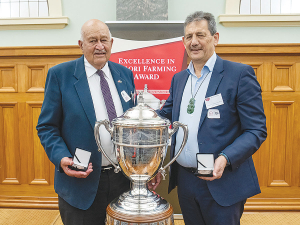Award-winning Māori farm severely damaged by isolated Northland thunderstorm
One of the country's top Māori farms has been badly damaged by a severe isolated thunderstorm which hit parts of the east coast of Northland last week.
 The chairs of the respective finalists Robert Edwards (L) and Kingi Smiler with the Ahuwhenua trophy. Photo Credit: John Cowpland - Alphapix.
The chairs of the respective finalists Robert Edwards (L) and Kingi Smiler with the Ahuwhenua trophy. Photo Credit: John Cowpland - Alphapix.
The finalists in this year’s Ahuwhenua Trophy competition to select the top Māori dairy farm in the country are now busy planning and organising field days at their respective properties.
The two finalists are Wairarapa Moana ki Pouakani Incorporation – based in Mangakino in the central North Island, and Whakatōhea Māori Trust Board – based in Opotiki.
The pair were announced recently at a special function at Parliament by the Minister for Māori Development, Tama Potaka and Minister of Agriculture Todd McClay.
About 100 people, ranging from politicians, diplomats, Maori and agribusiness leaders and the finalists themselves, attended the function. Potaka told the gathering that the finalists exemplify excellence in the dairy sector and, through their innovation and hard work, are inspiring the next generation of Māori farmers.
“Māori farming is a critical anchor of the Māori economy and a powerful driver of the New Zealand economy. I’m particularly proud of the way so many Māori farmers balance economic benefit with sustainable environmental protection,” he says.
Nukuhia Hadfield, chair of the Ahuwhenua Trophy Management Committee which organises the competition, says the dairy sector, like all primary sectors, faces huge challenges. These include global financial disruption, war, rising costs and some major markets that are taking longer than expected to recover from the Covid pandemic.
“Our dairy farmers are not immune from these challenges, but this has not deterred them from entering this year’s competition,” she says.
About The Farms
Wairarapa Moana Incorporation’s (WMI) operations consists of 12 dairy units across 4300ha – plus three dairy support units comprising 1900 ha and two forestry blocks totalling 6100ha.
It aims to produce five million kilograms of milksolids from its 12,000 cow herd and is the largest supplier to milk processor Miraka Ltd, of which it is a cornerstone shareholder.
Wairarapa Moana originally owned valuable land and fishing rights in the southern Wairarapa but by the late 1800s continual pressure from farmer settlers and the Crown coercion ultimately led to them being forced off their land and in 1915 they reluctantly accepted land at Mangakino.
“The story about the success of Māori agriculture is slowly getting out there but it still needs a lot of work and the Ahuwhenua competition helps keep that profile out there,” says WMI chair Kingi Smiler.
The second finalist is Whakatōhea Māori Trust Board’s dairy farm – a collective of five dairy farms located 4km south of Ōpōtiki. The dairy platform is 218ha effective, made up of 175.7ha of corpus whenua, a 29ha addition to the block and 13.3ha leased. It says the 3-4 farming system they run has helped balance on-farm feed and external sourcing.
The farm winters 748 cows and milks 690 at peak. They rear stock on a 346ha support block at the Motu, 10km north of Matawai in the Gisborne catchment. This financial year they raised 190 R1 heifers, 190 dairy heifer calves and 350 beef calves. There are four permanent staff on-farm and one casual, along with two calf rearers when required.
Chair of the Trust, Robert Edwards, says it is delighted to be a finalist in the competition. He says a lot of hard work has gone into getting the farm to its present high standard.
“We decided about a year ago to enter the competition and I am very happy with what we have done and it’s great for us just to be in the finals,” he says.
Field days to which the public are invited to attend will be held at Wairarapa Moana on Thursday March 28 and on Thursday April 4 at Whakatohea.
The winner will be announced at a function in Hamilton on Friday May 17.
Associate Agriculture Minister and Manawatu dairy farmer Andrew Hoggard says the free trade agreement (FTA) negotiated with India is not a bad deal and his party, Act, will support it when it goes before Parliament.
Newly released data from Environment Canterbury (ECan) Farm Environment Plan (FEP) audits are showing a dramatic lift in environmental performance across the region.
A solid recovery of global dairy prices this year makes a $9.50/kgMS milk price almost a shoo-in for this season.
As New Zealand marks the United Nations’ International Year of the Woman Farmer 2026 (IYWF 2026), industry leaders are challenging the misconception that women only support farming.
Fonterra’s impending exit from the Australian dairy industry is a major event but the story doesn’t change too much for farmers.
Expect greater collaboration between Massey University’s school of Agriculture and Environment and Ireland’s leading agriculture university, the University College of Dublin (UCD), in the future.

OPINION: Here w go: the election date is set for November 7 and the politicians are out of the gate…
OPINION: ECan data was released a few days ago showing Canterbury farmers have made “giant strides on environmental performance”.